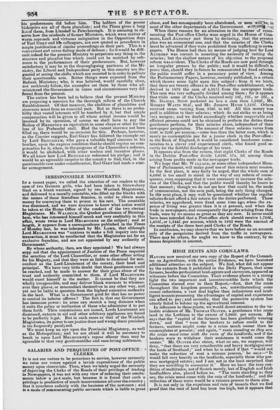IRRESPONSIBLE MAGISTRATES.
IN a recent paper, we called the attention of our readers to the case of two German girls, who had been taken to Shrewsbury Gaol on a blank warrant, signed by two Wenlock Magistrates, and.delivered to a rascally constable, who filled up the blanks with the names of these friendless females, in order to obtain some money for conveying them to prison in his cart. The constable was dismissed, and we were anxious to know what notice would be taken at the Home Office of the conduct of the two clerical Magistrates. Mr. WALDUCK, the Quaker gentleman of Birming- ham, who has interested himself much and very creditably in this affair, wrote twice to Lord MELBOURNE on the subject ; and at length, it appears from a correspondence published in the Times of Monday last, he was informed by Mr. LAMB, that although Lord MELBOURNE was "anxious to make a full inquiry into the transaction, it must-be recollected that the Magistrates act for an exclusive franchise, and are not appointed by any authority of Government" By whose authority, then, are they appointed ? We had always supp sed that the appointment of Justices of the Peace required the sanction of the Lord Chancellor, or some other officer acting for his Majesty, and that they were as liable to dismissal for mis- conduct as the Lord-Lieutenant of the county, their head and principal. We have very little doubt that these gentlemen could be reached, and be made to answer for their gross abuse of the trust and authority committed to them, if Lord MELBOURNE would exert himself in the matter. It cannot be that they are wholly irresponsible, and may deliver blank warrants to whomso- ever they please, or misconduct themselves in any other way, and yet not be liable to question from the highest executive authority in the land. What is a Government good for that has no power to control its inferior officers? The fact is, that our Government has immense power: its arms can stretch a long distance when it suits the policy or inclination of those who administer it to put them forth. Then commissions are issued, Lords Lieutenant are dismissed, extents in aid and other arbitrary appliances are found to be perfectly legal. But in such cases as that of" the Wenlock Magistrates, its power to see justice done and wrong-doers punished is too frequently paralyzed. We must keep an eye upon the Provincial Magistracy, as well as the Metropolitan; and we are afraid it will be necessary to break in upon Lord MELBOURNE'S repose oftener than may be agreeable to that very gentlemanlike and ease-loving nobleman.


















 Previous page
Previous page